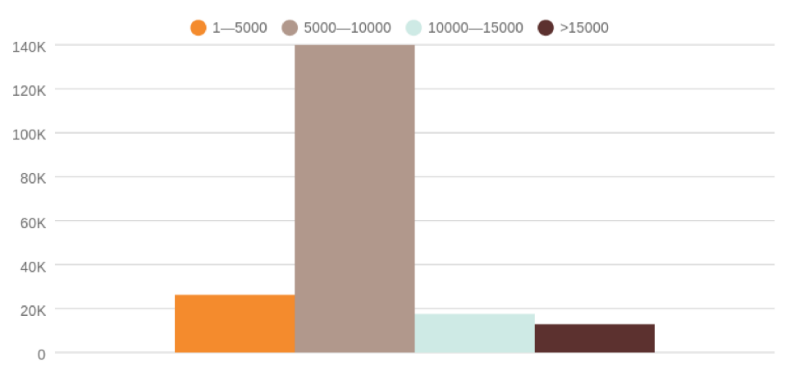Content marketing in English: 5 important numbers to help startups

Content marketing is an effective method of promoting a startup abroad. There are ways to attract hundreds and thousands of users, even with a budget of just $ 200 . However, you need to approach the creation of corporate content wisely.
I selected 5 important statistical indicators that should be considered when creating a content strategy and its implementation in the English language direction.
')
36% of readers prefer headlines as a list
Despite the fact that the so-called listicles, that is, posts in the form of lists, are considered low genres of content marketing, they are really effective. The most common number is 36% of readers prefer headlines with numbers (“10 ways”, “5 reasons”, etc.).
One can argue with this figure, yet it has been on the net of the year since 2014, but the fact remains that English-speaking readers really love such headlines. It is easy to understand why this is the case - such headlines immediately answer a lot of questions:
- What will be the article ("10 ways to write a popular blog post").
- What exactly will be in it (tips on creating content);
- The approximate duration (10 ways is a lot, it would be five, it would be possible to read faster).
Note : the lists are great for your own company blogs, but if you want to write serious texts, for example, to be placed in the media, practice creating content of a different format. It was not for nothing that I said that listicles are considered low genre - many not-so-popular startup resources will not take such texts.
Well, in any case, in addition to 36% of those who love lists, there are still 64% of the rest of the readers, whom we should not forget.
16 posts per month give 3.5 more traffic than 4 posts
Content marketing stands on two pillars — regularity and quantity. The more quality content you regularly publish, the better your blog results over time.
According to HubSpot, companies that publish 16 or more blog posts per month receive 3.5 times more traffic than companies that publish 0-4 material. The conclusion is simple - you need to try to publish the post daily.
For the growth of search traffic you need articles no shorter than 2000 words
As one of the leading American marketers, Neil Patel, writes in his blog, the average length of pages that occupy Google positions in the top 10 results is 2,000 words. The higher in the search results the page is, the more content there is: on average, the first result in the issue has 2400+ words, and the tenth result is about 2030 words.
Thus, to increase search traffic, you need to publish articles of at least 2000 words in a blog.
At the same time, if your goal is not to receive search traffic, but to publish some materials in the media, then other logic works here. It is important to start from the style of the publication - often on some resource it is customary to publish shorter content, and it is more familiar to readers. For example, according to research data , visitors of the popular tech site TechCrunch prefer medium-length articles - from 5 to 10 thousand characters. For example - 6000 characters is about 1100 English words, that is, such content will in any case be less than 2000 words.

Publications with images viewed at 94% more often
Statistics PRDaily resource confirms the popular thesis that it is easier for people to perceive visual content. Even in the case of texts, the relevant pictures make it possible to dilute the canvas and add meaning.
Illustrations allow you to visualize the theses set forth in the text. As a result, on average, materials with such visual content are viewed more frequently.
Ideal time for publication: after 11am on weekdays and after 9am on Saturday
According to research data, blog articles published after 11 am receive the greatest coverage. At the same time, readers leave the largest number of comments to materials published on Saturday after 9 am - this can be explained by the fact that the amount of published content drops significantly during weekends, and many people become elementary with nothing to read. At the same time, on Sunday, everyone is already engaged in family affairs and are less likely to surf the Internet. The largest number of external links get articles that were published on Monday or Thursday after 7 am.
There is also evidence that materials published on Tuesday receive the most “sheirs” on social networks and, as a result, the most views. However, LinkedIn and Pinterest users, by contrast, prefer to share links to blog posts on Monday.
Conclusion: What does all this mean for business?
Content marketing in the English-language direction is not an easy task, which requires considerable effort, resources and time. In order to achieve long-term success, companies need to:
- experiment with publication formats — making lists, how-tos, manuals, and other types of posts to understand what works best for their audience;
- publish content regularly and often - one article per week will not save anyone and is unlikely to give a good result;
- articles should be developed - business needs to either study the texts and make them longer to increase search traffic, or try to find sites with shorter formats;
- you need to pay attention to illustrations - to prepare them, to make sure that the pictures make reading easier and add information load;
- try different approaches to the time of publication, including experiments with posts on weekends.
As you can see, this is all really not easy, so there is nothing surprising in the fact that, according to statistics , almost 60% of business blogs use the work of outsourcing specialists — otherwise it’s unrealistic to fulfill all the conditions described above.
Source: https://habr.com/ru/post/451582/
All Articles